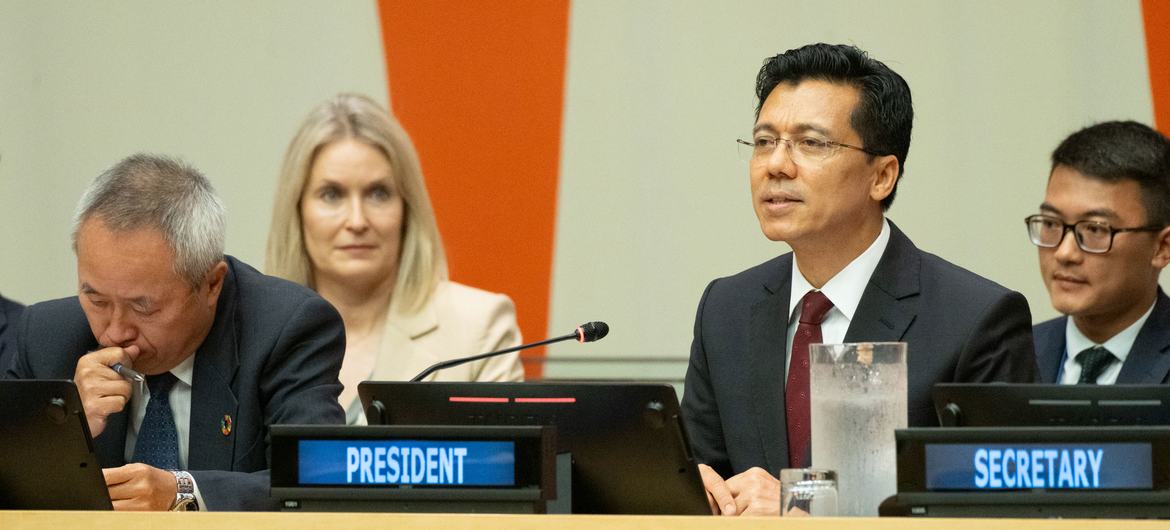

 20.02°C काठमाडौं
20.02°C काठमाडौं

Kathmandu: Nepal has achieved another milestone in United Nations. On July 31, the Ambassador of Nepal to the United Nations, Lok Bahadur Thapa, was elected president of the Economic and Social Council (ECOSOC). After electing as the President of one of the major organ of UN, Ambassador Thapa called it as a “historic moment” for his country and its enduring commitment to multilateralism.
Ambassador Thapa said that the motto of his presidency will be “Delivering Better,” which requires strengthening partnerships and multilateralism to achieve more effective implementation of initiatives, including the 2030 Agenda for Sustainable Development.
“Delivering better is not an option — it is an imperative. It is our pathway to restoring trust in multilateralism, bridging divides, empowering the most vulnerable and translating commitments into action,” he said.
Four vice-presidents were also elected for the coming year: Amar Bendjama (Algeria), Héctor Gómez Hernández (Spain), Wellington Darío Bencosme Castaños (Dominican Republic) and Paruyr Hovhannisyan (Armenia).
The UN Economic and Social Council (ECOSOC) is one of the six principal organs of the United Nations, responsible for promoting international economic and social cooperation and development. It has 54 member States, elected by the General Assembly for three-year terms on a rotating basis, with seats distributed by region.
ECOSOC coordinates the work of UN specialized agencies, commissions and bodies on issues ranging from sustainable development and human rights. It also serves as a central platform for fostering debate, forging consensus, and promoting action on global economic and social issues.
For Ambassador Thapa, this body is central to shaping the world’s development agenda and ensuring that no one is left behind.
“ECOSOC is our place. It needs dedication, participation and active engagement of all UN membership and stakeholders,” he said.
While “delivering better” will be the motto of Ambassador Thapa’s presidency, he outlined five specific areas upon which he and the Council will focus in the coming year.
With over 735 million people worldwide experiencing hunger, his first priority area is transforming agriculture to strengthen rural resilience and end hunger.
Digital entrepreneurship and youth engagement are tied to this — and are his second priority area. He noted the “youth bulge” in many developing countries which he said will be a powerful demographic asset if it can be taken advantage of.
Like ECOSOC presidents before him, his third priority area deals with climate action and resilience. This time, however, he would like ECOSOC to focus specifically on glacier lakes and floods.
His final two priority areas are reforming the international financial architecture so that it is more inclusive and commemorating the 80th anniversary of ECOSOC.
Ambassador Thapa noted that he and ECOSOC’s membership will be working to achieve these challenges in the midst of multiple, interlinking crises including accelerating climate change, rising geopolitical tensions and decreasing trust in the multilateral system.
“These challenges are systemic and interconnected. They demand integrated, inclusive and forward-looking responses,” Ambassador Thapa said.
Before Ambassador Thapa’s remarks, Bob Rae, the outgoing president of ECOSOC and Canada’s Ambassador to the UN, reflected on his tenure. He acknowledged that the world is currently in a time of great hardship and genuine anguish.
But he said that it must be the job of ECOSOC — and UN Member States more broadly — to not only give voice to this anguish and hardship but to actually find solutions for it as well.
“We hear a lot in the UN discourse about how things are broken, how things have fallen apart, how things are unhinged…But our job is to fix, it’s to repair, it’s to mend, it’s to allow things to heal, it’s to make change happen,” Rae said.
Both Mr. Thapa and Mr. Rae affirmed that multilateralism can work and that ECOSOC should play a unique role in rewriting the narrative surrounding international cooperation.
“We must reaffirm our collective belief in the power of multilateralism — not as an abstract ideal, but as a pragmatic tool for delivering better outcomes for all,” Ambassador Thapa said.
Source: UN News